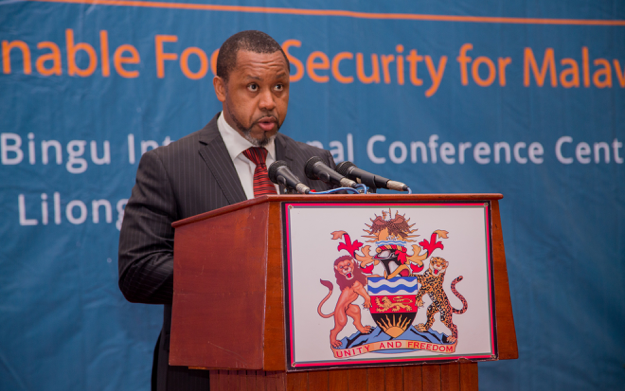How can Malawi accelerate progress in moving from being a recipient of food relief to building food system resilience? That was the question the recent Compact2025 Malawi Forum in Lilongwe examined, gathering stakeholders from across ministries, development and research organizations, and civil society at a half-day event hosted by IFPRI.
The Compact2025 initiative aims to end hunger and undernutrition by 2025, with an initial focus on four countries: Malawi, Ethiopia, Rwanda, and Bangladesh.
Malawi’s agricultural sector is crucial to its economy, and is also vulnerable to climate change shocks, Malawi Vice President Saulos Chilima, a member of the Compact2025 council, said in his keynote address. Agriculture has typically received the largest budget allocation of all sectors in Malawi, and is second only to education in the 2017-18 national budget, he said. However, this level of expenditure has not mitigated the impacts of bad weather years on the economy and on agricultural sector growth, which fell from 6.2 percent in 2014 to -1.0 percent in 2015 and -0.2 percent in 2016.
Amid this anemic growth, undernutrition remains a persistent problem, Chilima said, costing the Malawian economy 10.3 percent of GDP each year. To tackle these problems, he said, stakeholders must discuss issues ranging from low labor productivity, to infrastructure development and the optimal mix of landholdings among small, medium and large-scale farmers in order to reduce ongoing vulnerability.
The forum examined the four pillars of the Malawi government’s forthcoming National Resilience Strategy (NRS): Resilient agricultural growth; risk reduction, flood control and early warning and response systems; human capacity, livelihoods and social protection; and catchment protection and management. Participants stressed that a multisectoral approach will be crucial to implementing the NRS.
For example, building resilient agricultural systems depends on restoring degraded forest landscapes to maintain healthy soils and water availability, said Clement Chilima, director of the Department of Forestry. Meanwhile, Readwell Musopole of the Department of Agricultural Planning Services pondered how the Ministry of Agriculture, Irrigation and Water Development could re-prioritize to increase investments in irrigation. The vice president also highlighted irrigation as a potential lever for economic growth, citing IFPRI research, and later lamented that the current agricultural architecture and the Farm Input Subsidy Program (FISP) has not been useful to build resilience, citing its social protection, rather than growth, orientation.
The importance of prioritizing investments was another common theme of the forum. Finance Minister Goodall Gondwe, Gender Minister Jean Kalilani, and IFPRI Director General Shenggen Fan all stressed that scarce funding and resources must be used efficiently. To achieve this, they said, Malawi must scale up pilot programs shown to work, based on the knowledge and experiences of partner organizations and on high-quality data. For example, Saulos Chilima pointed to research demonstrating that investments to reduce stunting have high returns for economic growth, and Health Minister Atupele Muluzi noted that Malawi has reduced stunting, vitamin A deficiency, and cases of anemia in recent years.
Effective policies depend on sound data, and participants agreed that there is still much work to be done to improve Malawi’s data collection and information systems. Suresh Babu, IFPRI’s head of capacity strengthening, noted that last year’s Food Insecurity Response Plan suffered from its reliance on poor market information systems, undermining important decision-making on how to help the poorest and most vulnerable. Other attendees said Malawi needs better data and analysis on gender and women’s empowerment, while business representatives argued that more transparency and information sharing are necessary for the private sector to be a key partner in resilience-building activities.
Going forward, Malawi stands to benefit greatly from mutual learning—in particular South-South learning—an important component of the Compact2025 initiative, Fan said in his concluding remarks. He suggested that Malawi learn lessons from other African countries’ successes, such as Ethiopia’s Productive Safety Net Program. He also pointed to the way Thailand has continued to prioritize and respect the role of research, despite extensive changes in governance over the years. Sharing knowledge and finding innovative approaches to ending hunger and malnutrition are the underpinnings of the Compact2025 Initiative, Fan noted, and IFPRI will continue to engage with Malawi in these efforts in the follow-up to this year’s forum.
Rachel Gilbert is a Leland Hunger Fellow and Communications and Research Assistant with IFPRI’s Malawi Strategy Support Program (MaSSP). This post first appeared on the MaSSP blog.







